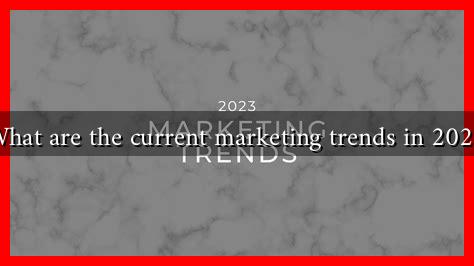-
Table of Contents
What are the Current Marketing Trends in 2023?
As we navigate through 2023, the marketing landscape continues to evolve at a rapid pace. Businesses are adapting to new technologies, changing consumer behaviors, and emerging platforms. Understanding these trends is crucial for marketers aiming to stay ahead of the curve. This article explores the most significant marketing trends of 2023, providing insights and examples to help businesses refine their strategies.
1. Personalization at Scale
Personalization has been a buzzword in marketing for years, but in 2023, it has reached new heights. With advancements in artificial intelligence (AI) and machine learning, brands can now deliver highly personalized experiences to consumers at scale.
- Dynamic Content: Brands are using AI to create dynamic content that adapts based on user behavior and preferences. For instance, Netflix utilizes algorithms to recommend shows based on viewing history, enhancing user engagement.
- Segmentation: Advanced segmentation techniques allow marketers to target specific demographics with tailored messages. According to a study by McKinsey, personalized marketing can lead to a 10-30% increase in revenue.
2. Sustainability and Ethical Marketing
Consumers are increasingly prioritizing sustainability and ethical practices when choosing brands. In 2023, companies that demonstrate a commitment to social responsibility are gaining a competitive edge.
- Eco-Friendly Products: Brands like Patagonia and Unilever are leading the way by offering sustainable products and transparent supply chains.
- Cause Marketing: Campaigns that align with social causes resonate well with consumers. For example, Ben & Jerry’s has successfully integrated social justice themes into their marketing, strengthening brand loyalty.
3. Video Marketing Dominance
Video content continues to dominate the digital landscape in 2023. With platforms like TikTok and Instagram Reels gaining popularity, brands are leveraging short-form video to engage audiences effectively.
- Live Streaming: Live video has become a powerful tool for real-time engagement. Brands like Sephora use live streaming to showcase products and interact with customers directly.
- Short-Form Content: According to a report by HubSpot, 54% of consumers prefer short videos (under 2 minutes) for learning about products. This trend is pushing brands to create concise, impactful content.
4. Influencer Marketing Evolution
Influencer marketing is evolving, with a shift towards micro and nano influencers. These individuals often have smaller but highly engaged audiences, making them more effective for niche marketing.
- Authenticity: Consumers are increasingly skeptical of traditional celebrity endorsements. Brands are now partnering with influencers who align with their values and resonate with their target audience.
- Long-Term Partnerships: Instead of one-off campaigns, brands are focusing on building long-term relationships with influencers to foster authenticity and trust.
5. The Rise of Voice Search and Smart Speakers
With the proliferation of smart speakers and voice-activated devices, voice search is becoming a critical component of digital marketing strategies in 2023.
- SEO Adaptation: Marketers are optimizing content for voice search by focusing on natural language and question-based queries. According to Google, 27% of the global online population is using voice search on mobile.
- Local Search Optimization: Voice searches often have local intent, prompting businesses to optimize for local SEO to capture nearby customers.
Conclusion
As we delve deeper into 2023, the marketing landscape is characterized by personalization, sustainability, video content, influencer evolution, and voice search. Brands that embrace these trends will not only enhance their marketing strategies but also build stronger connections with their audiences. By staying informed and adaptable, marketers can navigate the complexities of this dynamic environment and drive meaningful results.
For more insights on marketing trends, consider exploring resources like HubSpot’s Marketing Statistics or McKinsey’s Marketing Insights.


